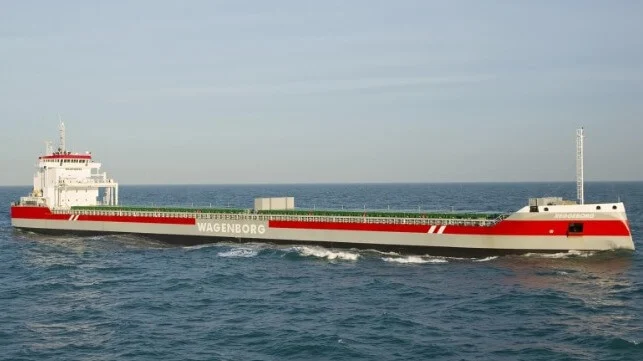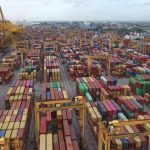Illegal demands for recruitment fees and withholding of vital travel documents are plaguing seafarers hoping to embark on a career in shipping, new research shows.
In a survey of more than 200 merchant navy sailors conducted by the Mission to Seafarers charity and Liverpool John Moores University in the UK, more than a third said they had been exploited for cash, while 20 per cent said they were offered no training while at sea.
The Gulf is one of the world’s busiest shipping hubs, acting as a transit point for vessels exporting and importing everyday goods and fuel.
According to the research, senior and junior deck officers were most vulnerable to demands from rogue recruitment agents, who look to exploit vulnerable crew looking for a career at sea.
One of those is Dhiraj Jha, 25, who left his family home in Delhi to find work at sea via a shipping agency in Mumbai.
Mr Jha was one of five young men recruited to join a company in Iran that operated a chemical tanker out of Bandar Abbas in December 2021.
“The contract was for six months, and I would be paid $250 a month for working on a tanker called the Sea Heart,” Mr Jha told The National.
“When I got to Tehran, I met with an agent who took our documents and then sent us to Bandar Abbas to meet the company.
“We were then told to start work on a completely different ship.”
Family loan
Mr Jha had been lent $1,800 (Dh6,500) by his mother to pay agency fees in Mumbai, and cover his travel costs. He has not been paid any money for his time at sea.
All the cash he earned was paid directly from his company to the agent who employed him and has since disappeared.
“There was no safety consideration on the vessel. We were just told to get on with tasks without any training,” said Mr Jha.
“I was told to clean the fuel and storage tanks without any safety equipment to protect me.
“We had no idea when we would be able to leave to go back home, despite calling the Indian embassy for help.
“It took six months for us to get a return travel ticket back to India. We were given hardly any food to eat, just small amounts of rice and dal.
“They treated us like animals, not like human beings.
“When we finally managed to get home, our employers said they had given our money direct to the agent, who had disappeared.”
Under the Maritime Labour Convention, no fees or charges should be borne by the seafarer during employment other than the costs of obtaining a statutory medical certificate, national seafarer’s book and passport or other travel documents. Visa costs must be borne by the ship owner.
In the Mission to Seafarers survey, 25 per cent of respondents were Filipino, 22 per cent were from India and 9 per cent Sri Lankan.
Of the respondents, 22 per cent said agents had made demands for placement fees, while 27 per cent said their travel documents had been unlawfully retained.
Common tactics
Almost one in three of the corrupt demands were made by agents based in India, the survey found.
“Seafarers who pay recruitment fees to get jobs often have to pool together funds from family members or take out high interest loans,” said Ben Bailey, director of programme at the Mission to Seafarers.
“If the contract doesn’t work out, or the crew are abandoned, they enter into a spiral of debt which places unimaginable stress on them and their families.
“This practice needs to stop if seafarers are to be better protected. Ratifying MLC and ensuring there are robust inspectorates in place will help.
“But we also need to ensure seafarers at home are aware of their rights under the MLC, and to empower them to challenge such injustices in their home countries.”
Common tactics used to exploit seafarers include agents falsely claiming to be licensed, or using brokers or middlemen to recruit crew, making it difficult to verify an agent’s legitimacy.
False job information or incorrect information on working conditions or type of vessel are other common pitfalls.
“Some fraudulent agents may provide false testimonials or references from other seafarers who claim to have successfully found employment through the agent,” said Chirag Bahri, international operations manager for the International Seafarers Welfare and Assistance Network.
“These testimonials are designed to create a sense of trust and credibility with seafarers.
“Fraudulent agents may offer seafarers unrealistic employment opportunities, such as jobs on prestigious vessels or high-paying positions requiring little experience.
“These offers are designed to entice seafarers into paying high fees or signing unfavourable contracts.”
When agents refuse to return seafarers’ documents, such as passports or certificates, until they pay additional fees or sign contracts, crew are often unable to seek employment opportunities elsewhere unless they pay-up.
In the UAE, the Ministry of Energy and Infrastructure will host a safety awareness week to highlight measures taken to improve psychological well-being of the maritime workforce who often spend months at sea, away from families.
A week of initiatives, from May 15-19, aim to improve the quality of life on board vessel while in UAE waters.
“The UAE remains steadfast in its commitment to creating a safer and more sustainable maritime industry for everyone,” said Hessa Al Malek, adviser to the Minister for Maritime Transport Affairs, UAE Ministry of Energy and Infrastructure.
“We will continue to explore every possible avenue to achieve this goal.”
Source: The National News






